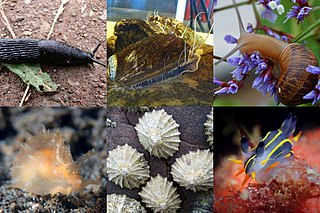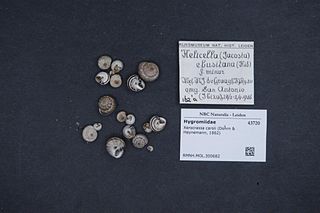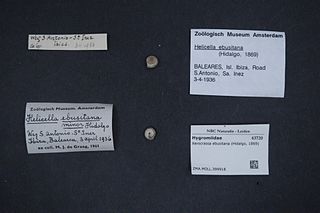
The gastropods, commonly known as slugs and snails, belong to a large taxonomic class of invertebrates within the phylum Mollusca called Gastropoda.
Islamia laiae is a species of small freshwater snail with a gill and an operculum, an aquatic gastropod mollusk in the family Hydrobiidae.
Pseudamnicola meloussensis is a species of small brackish water snails with an operculum, aquatic gastropod mollusks in the family Hydrobiidae.
Pseudamnicola artanensis is a species of very small brackish water snail with an operculum, an aquatic gastropod mollusk in the family Hydrobiidae.
Bithynia pauli is a species of small freshwater snail with a gill and an operculum, an aquatic prosobranch gastropod mollusc in the family Bithyniidae.
Bithynia canyamelensis is a species of small freshwater snail with a gill and an operculum, an aquatic prosobranch gastropod mollusc in the family Bithyniidae.
Bithynia riddifordi is a species of small freshwater snail with a gill and an operculum, an aquatic prosobranch gastropod mollusc in the family Bithyniidae.
Bithynia manonellesi is a species of small freshwater snail with a gill and an operculum, an aquatic prosobranch gastropod mollusc in the family Bithyniidae.
Radix jordii is a species of air-breathing freshwater snail, an aquatic pulmonate gastropod mollusk in the family Lymnaeidae, the pond snails.

Pachychilidae, common name pachychilids, is a taxonomic family of freshwater snails, gastropod molluscs in the clade Sorbeoconcha.

Freshwater snails are gastropod mollusks that live in fresh water. There are many different families. They are found throughout the world in various habitats, ranging from ephemeral pools to the largest lakes, and from small seeps and springs to major rivers. The great majority of freshwater gastropods have a shell, with very few exceptions. Some groups of snails that live in freshwater respire using gills, whereas other groups need to reach the surface to breathe air. In addition, some are amphibious and have both gills and a lung. Most feed on algae, but many are detritivores and some are filter feeders.

Xerocrassa caroli is a species of air-breathing land snail, a pulmonate gastropod mollusk in the family Geomitridae.
Xerocrassa cisternasi is a species of air-breathing land snail, a pulmonate gastropod mollusk in the family Geomitridae.

Xerocrassa ebusitana is a species of air-breathing land snail, a pulmonate gastropod mollusk in the family Geomitridae.

Xerocrassa frater is a species of air-breathing land snail, a pulmonate gastropod mollusk in the family Geomitridae.

Xerocrassa homeyeri is a species of air-breathing land snail, a pulmonate gastropod mollusk in the family Geomitridae.
Xerocrassa moraguesi is a species of air-breathing land snail, a pulmonate gastropod mollusk in the family Geomitridae, the hairy snails and their allies.
Xerocrassa nyeli ponsi is a subspecies of air-breathing land snail, a pulmonate gastropod mollusk in the family Geomitridae.

The wildlife of Spain includes the diverse flora and fauna of Spain. The country located at the south of France has two long coastlines, one on the north on the Cantabrian Sea, another on the East and South East on the Mediterranean Sea, and a smaller one on the west and south west on the Atlantic Ocean, its territory includes a big part of the Iberian Peninsula, the Canary Islands, the Balearic Islands and two enclaves in North Africa, Ceuta and Melilla. The country has many endemic species, especially those restricted to the island groups, and mainly because of the rich geography and the different climate zones, Spain is one of the countries in Europe with the greatest biodiversity.







